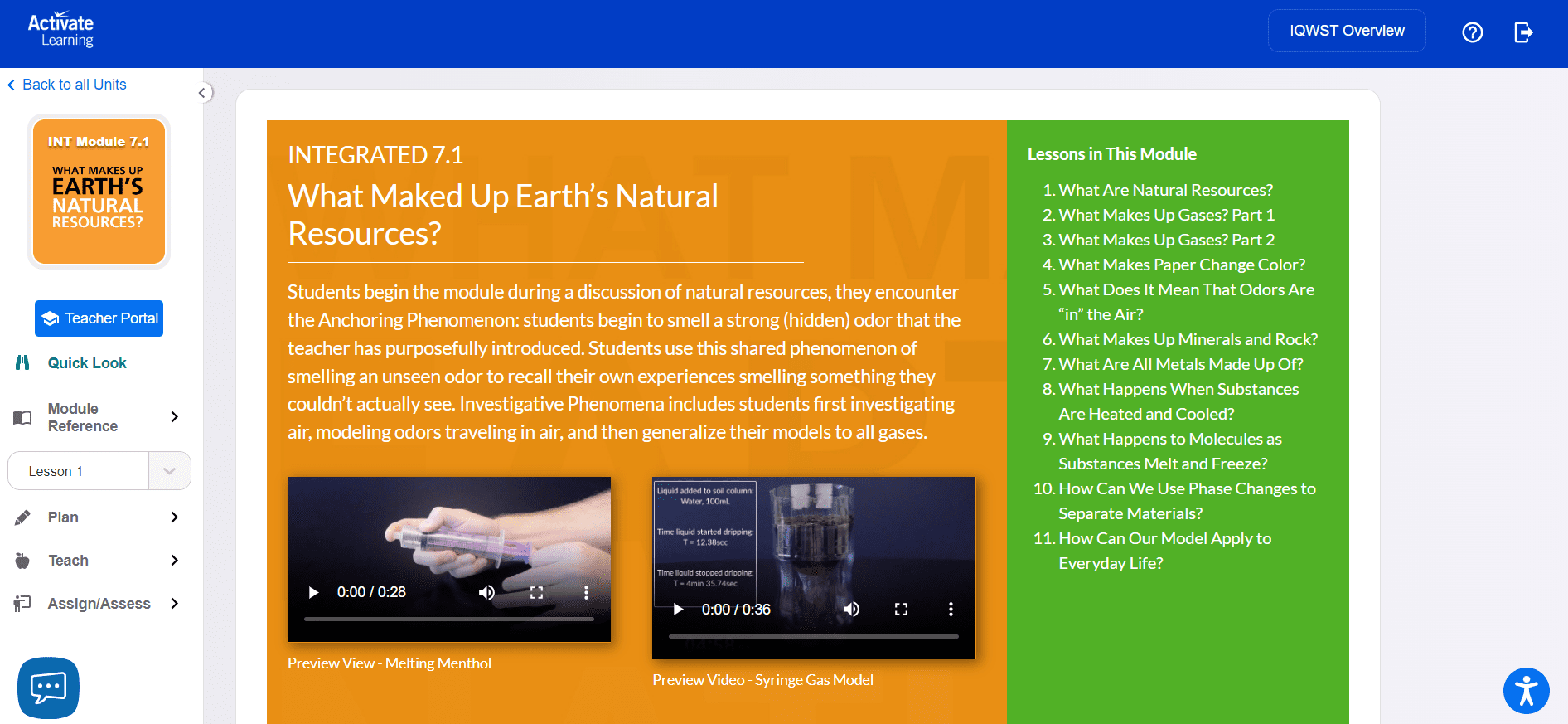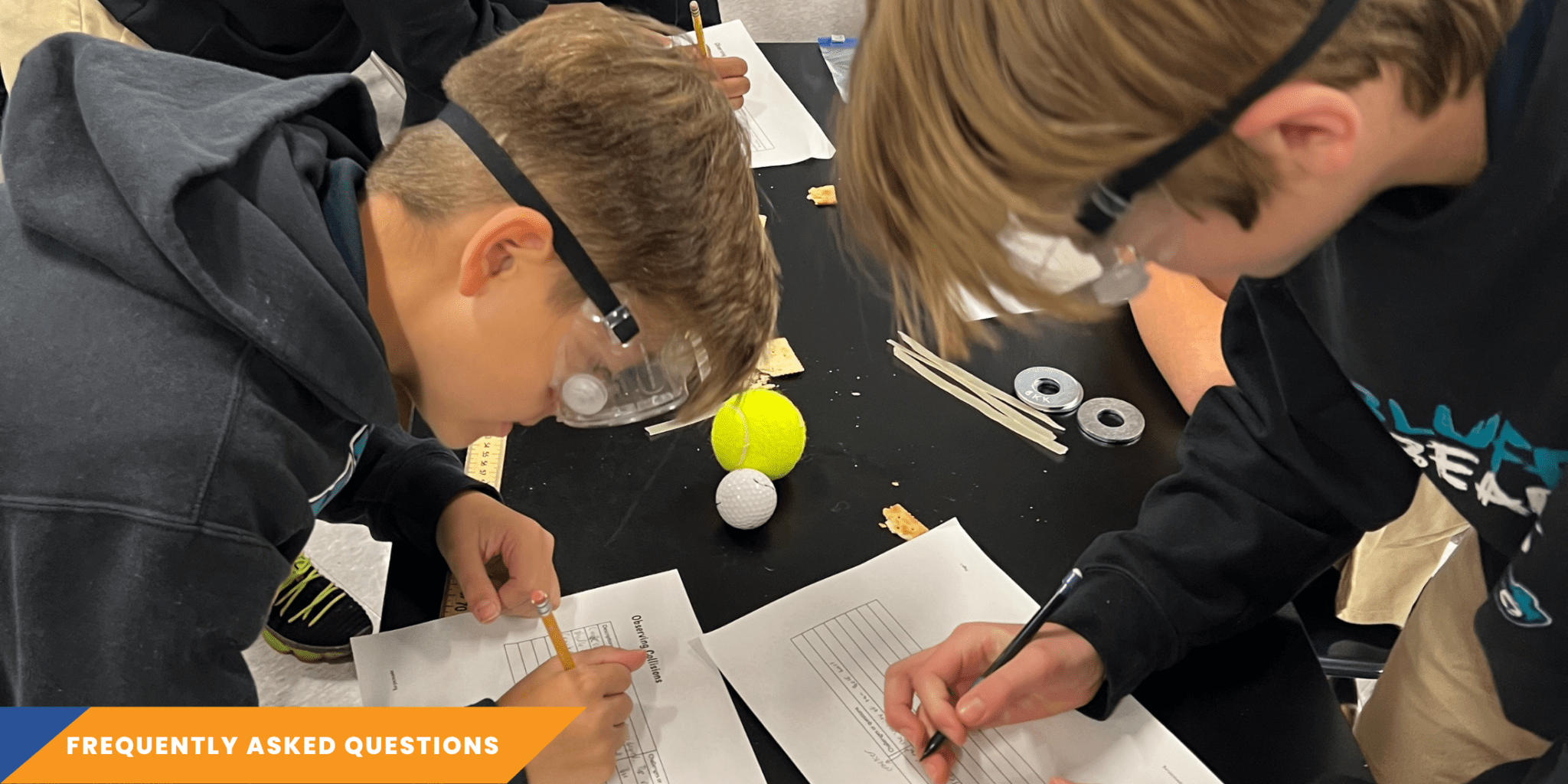
Explore the IQWST Integrated Edition
This program integrates at least two disciplines in each of its 12 modules: Physics, Chemistry, Life Science, Earth Science, and/or Engineering Design.
This program’s “learning-by-doing” pedagogical approach engages students as active learners and makes science come alive in ways that research has shown best support the broad range of learners found in every classroom. Students investigate questions relevant to their own daily lives by conducting investigations, collecting and analyzing data, developing and using models to explain phenomena, and engaging in healthy debate from evidence.
Investigation-Centered
Storyline Approach
Referencing real-world science with which students from all backgrounds are familiar allows students to value science learning, and apply what they are learning to their everyday lives.
Students Learn Like Scientists and Engineers
Students pursue their own original questions in units that integrate the fundamentals of Physical Sciences, Life Science, and Earth & Space Science.
Total Support
for Teachers
In person and online teacher support, educational webinars, lesson modeling, and much more is provided by our Professional Learning Team.
Need more info to decide if this the right curriculum for your district or school?
Curriculum Details
At its core, IQWST engages students in scientific practices as they experience, investigate, model, and explain phenomena while learning core ideas and engaging in concepts that cross disciplinary boundaries.
This program engages students in three-dimensional learning as they:
- Experience, investigate, model, and explain interesting phenomena.
- Learn core ideas.
- Engage with concepts that cross disciplinary boundaries.
Student-Driven Learning
Curricular Coherence
IQWST utilizes Circular Coherence - revising and building on ideas across time. This provides students with opportunities to develop, reinforce, and apply their understandings on an ongoing basis throughout their middle school years.
Driving Question Board (DQB)
A powerful visual tool that puts students at the center of their learning experience! The Driving Question Board (DQB) is a large poster board prominently displaying the driving question in each unit for exploring phenomena at its center, surrounded by sub-questions that represent the main learning goals. It’s a collaborative creation, jointly constructed by both students and the teacher at the start of the unit, and it evolves throughout the learning process.
Instructional Design with Teachers in Mind
Classroom Implementation
IQWST Teacher Edition includes lesson plans, discussion questions, differentiation strategies, and background information for each unit, and Video Tutorials on activity set ups are also available.
Remote Learning Options
The Remote Learning Lesson Plans condense what is taught in each activity with specific teaching recommendations and identify the digital resources, print resources, and materials needed to teach and learn outside of the classroom.
Claim, Evidence, & Reasoning (CER)
The CER Framework was born and developed in IQWST as a result of teachers’ desire to better support their students as scientific thinkers and writers.
ONPAR Digital Assessments to Effectively Gauge Student Learning
An innovative 3-dimensional assessment system designed to be accessible to diverse students, and to provide rich formative information to both teachers and students.
In addition, ONPAR digital assessments have been found to be beneficial by many districts in providing student experience with the format and content of state tests.
IQWST Integrated Modules
IQWST Integrated addresses the newest science standards in 12 modules, four per grade level 6-8. Each module integrates at least two disciplines: Physics, Chemistry, Life Science, Earth Science, and/or Engineering Design.
Students build understanding by connecting ideas from lesson to lesson, from module to module, and across the middle grades.
Research-Based Design
IQWST® was developed over a decade by science education, literacy, and learning science specialists from the University of Michigan, Northwestern University, Michigan State University, and the Weizmann Institute of Science, supported by funding from the National Science Foundation.
At IQWST’s foundation is the latest research on how students learn and how they learn science in particular, the very research on which the Framework for K–12 Science Education and the Next Generation Science Standards are also based.
Digital Platform
The Activate Learning Digital Platform (ALDP) hosts the interactive digital edition of the Active Physics teacher and student curriculum materials.
The platform is designed for student accessibility and inclusion and offers embedded translation for over 130 languages and text-to-speech with read-along highlighting in 35 languages.
Featuring an intuitive user experience, teachers have everything they need to Plan, Teach, Assign, and Assess lessons in a platform that is integrated with leading SIS rostering and Learning Management Systems such as Google Classroom, Schoology, and Canvas.
About The Authors
IQWST® was developed through grant funding from the National Science Foundation (NSF). The development team has combined expertise in science education, literacy education, and the learning sciences. The team was led by Principal Investigators Joe Krajcik, Ph.D., Brian Reiser, Ph.D., LeeAnn Sutherland, Ph.D., and David Fortus, Ph.D.
*This material is based upon work supported by the National Science Foundation under Award No. DRL 0439352 and ESI 0101780. Any opinions, findings, and conclusions, or recommendations expressed in this material are those of the author(s) and do not necessarily reflect the views of the National Science Foundation.
Joe Krajcik has focused on working with science teachers to reform science teaching practices (3-Dimensional Learning) to promote students' learning of science. He was head of The Next Generation Science Standards (NGSS) Physical Science Design team and led the Physical Science Design Team for the Framework for K – 12 Science Education.




